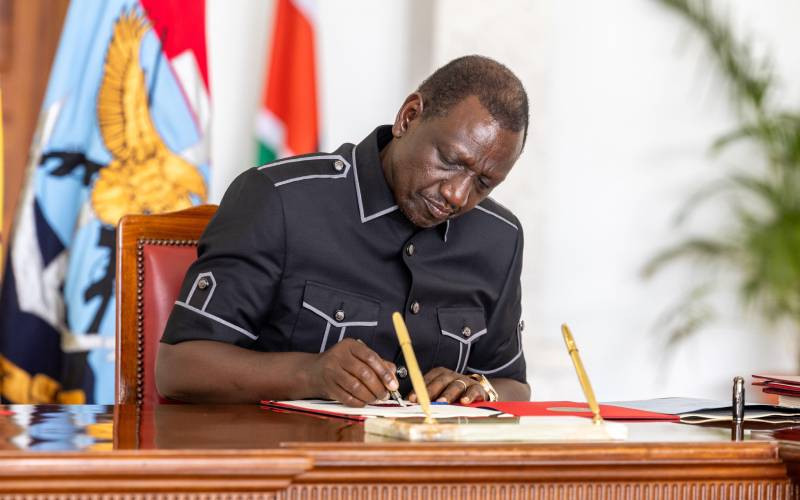Public Watchdog
Today, Public watchdog begins with a rhetorical
question: Who cares about the people? Certainly, not those you think are responsible for managing our public affairs, collectively referred as leaders. Yes, Cotu Secretary General Francis Atwoli is right to ask our collective leaders to stop political theatrics and care more about people’s plight. We are witnessing rising inflationary pressure, rising cost of living and worsening unemployment and poverty levels.
The prices of essential goods and services are becoming unaffordable, with Kenyans literally barely surviving. One has to witness the small package of everything, from bread, flour, cooking oil to sugar to appreciate the extent of erosion of the purchasing power and food insecurity. Access to food means ability to afford at going prices and the inverse leads to food insecurity no matter how plenty the food might be in the market.
This is an appropriate characterisation of the current state of our nation’s affairs for majority of Kenyans in urban and rural areas. This spells a time bomb waiting to explode. What, then, are the critical matters?
Saddening
First, it is saddening that with this dangerous characterisation, our leaders on a sustained basis appear to worry more about their personal political preservation and ascending to political power, to fix or stop their competing opponents from ascending or gaining advantage in current succession politics. Why? We seem to have plenty of opportunities to fight, with tribal cocoons now serving as useful launch pads and sense of source of false security.
Thus, we always turn to those who have nothing, absolutely little or nothing for their support, to gain political power, in return promising to tackle their poverty, unemployment, health services and create plenty opportunities for improvement of their standards of living. Indeed, we the people are only relevant during election time.
Promises
Electorates are unfortunately viewed as voting tools on behalf of those erroneously thought to be able to stand for wider public course. True, the people are showered with plenty of promises of hope and expectations, and often with limited celebratory consumption goodies.
During elections, drinks are served and sugar distributed in plenty. Women and youth certainly find themselves relevant and most valued breed with several empowerment measures initiated.
Then after elections, it becomes business as usual. It is always everyone for themselves until the next election, this time 2011/2012, thereafter, 2017. We are, then, as the electorate, treated with sustained political theatrics year in, year-out, having fulfilled our mandate of putting these leaders to positions of authority.
Second, today our dream on prosperity has become elusive. Sustained politicking and false hope in better governance remain our sad story as a country, a fact we loathe telling, but having to tell it so that tomorrow becomes better.
Everyday, our collective leadership across the political divide acts in a manner that would appear they care, but in reality only serve as populist and not through people-centred measures. But why?
The people have become gullible to political machinations due to entrenched poverty and unemployment, making the wider population to live on political handouts.
Stay informed. Subscribe to our newsletter
We are made to be the defenders of political interests, more often in reality serving the vested courses of those whom we elect or are elected to positions of power.
Kenya, as a country, is perhaps now at a crossroads of either progressing towards a promise of prosperity emboldened by the new Constitution or drifting into a major polarisation or possibly a state of hopelessness due to growing poverty, unemployment, corruption and tribalism.
Third, we can reverse this course by putting in Government those who truly care about people’s interests and not only their self-preservation as political class.
That responsibility rests on us, the people, but only if we choose to exercise wisely the will power we hold, which serves as our hope and key of success. The ultimate question, however, remains whether rather than when, as the latter is now imminently coming next year. Perhaps, after next year we can say: We deserve the leadership we get, as we shall have had an opportunity to effect changes we so desire as a people.
Price-Stabilisation
Finally, on the cost of living, the Government should consider market-based price intervention and price stabilisation mechanism and deal with both fiscal and monetary policy tools. We must ensure a stable macro economic condition with respect to exchange rates policy given its multiplier impact on the general price level cost push inflation.
However, we cannot support a 60 per cent general wage increase as proposed by Atwoli, as this would be fuelling inflation and undermining any quest to bring the cost of living under control.
One thing is, however, obvious:
the accelerated depreciation of Kenyan shilling exchange rate has a serious negative impact on the economic productivity, imports of raw materials, fuel, external debt, including exports due to input imports.
The debate, therefore, must now focus not on whether, but on how to intervene to achieve a positive equilibrium for the growth of the economy and social justice, this matter being of compelling public interest!
Comments to
[email protected]
 The Standard Group Plc is a
multi-media organization with investments in media platforms spanning newspaper
print operations, television, radio broadcasting, digital and online services. The
Standard Group is recognized as a leading multi-media house in Kenya with a key
influence in matters of national and international interest.
The Standard Group Plc is a
multi-media organization with investments in media platforms spanning newspaper
print operations, television, radio broadcasting, digital and online services. The
Standard Group is recognized as a leading multi-media house in Kenya with a key
influence in matters of national and international interest.
 The Standard Group Plc is a
multi-media organization with investments in media platforms spanning newspaper
print operations, television, radio broadcasting, digital and online services. The
Standard Group is recognized as a leading multi-media house in Kenya with a key
influence in matters of national and international interest.
The Standard Group Plc is a
multi-media organization with investments in media platforms spanning newspaper
print operations, television, radio broadcasting, digital and online services. The
Standard Group is recognized as a leading multi-media house in Kenya with a key
influence in matters of national and international interest.







